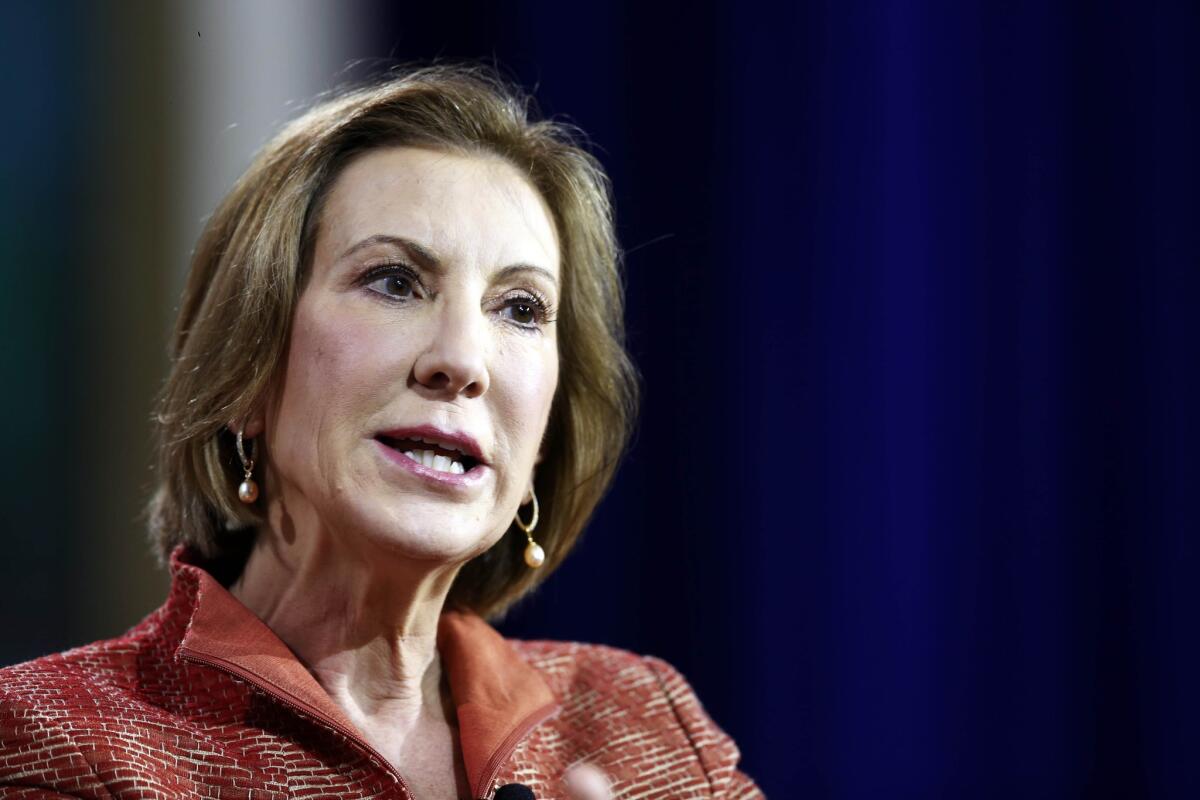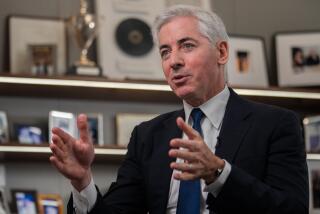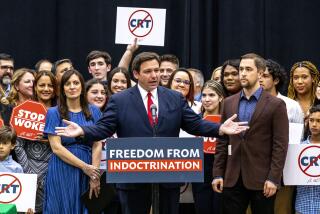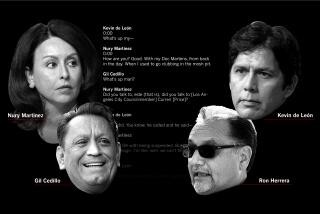The truth about Carly and Tom: An old adversary’s strange defense of Fiorina

Republican presidential candidate Carly Fiorina: an old adversary has just come out in favor of her campaign
- Share via
Politics makes strange bedfellows, even more so when the relationship is strange to begin with.
The observation is prompted by a full-page advertisement placed in Thursday’s New York Times by Carly for America, the super PAC backing former Hewlett-Packard Chairwoman Carly Fiorina’s campaign for the Republican presidential nomination. The ad, headlined “The Truth About Carly,” features a letter signed by multimillionaire venture capital investor Thomas Perkins defending her management at HP and expressing his support for her candidacy.
It’s a curious document. Perkins was a board member of HP during much of Fiorina’s tenure as its chairwoman and chief executive (1999-2005). In her 2006 memoir, “Tough Choices,” she depicts him as a member of the cabal that forced her out and a close ally of George Keyworth, the director who was her leading adversary.
Before we get into the details, a few things about Fiorina and Perkins. As we related here, her reign at Hewlett-Packard is widely regarded as disastrous, characterized by unimaginative strategy, a sinking share price, and conflict with her own board.
Perkins, who was a founder of the elite Silicon Valley venture capital firm Kleiner, Perkins, Caufield & Byers, bubbled up into public awareness last year with a remarkably ill-considered screed in the Wall Street Journal comparing public criticism of himself and his fellow “one percent” (the rich) to the “fascist Nazi Germany...war on its ‘one percent,’ namely its Jews.” He asserted that “the demonization of the rich” in America today foretold a “Kristallnacht” against his class -- Kristallnacht being the violent pogrom against Jews on Nov. 9-, 1938, in Germany and Austria that brought the Nazi campaign against Jews to worldwide consciousness.
At the time, we labeled his outburst “vulgar” and “ghastly” and reminded readers that Perkins had long been a flag-carrier for class privilege and for his own self-regard: “In 2007, in connection with the publication of his memoir ‘Valley Boy,’ he allowed ’60 Minutes’ to profile him. He directed reporter Lesley Stahl’s attention to his 298-foot boat, the Maltese Falcon, and remarked, ‘I just wanted the biggest boat....Do I have an ego? Yes. Is it big? Yes.’”
He had been married to Danielle Steel, the author of bodice-rippers, and tried to emulate her with a “potboiler entitled “Sex and the Single Zillionaire.” “Was this vanity project any good?” we asked. “One reviewer on Amazon.com’s website called it ‘an argument in favor of book-burning.’”
In short, he’s the sort of political supporter that only a plutocrat could love.
Perkins’ lack of self-awareness resurfaces in the new ad. He describes the HP board of the Fiorina era as “ineffective and dysfunctional,” which is certainly true. But he further observes that “some board members fought for their own power or advancement...[and] wanted to micro-manage the company, hand-picking friends and allies to run divisions.”
As it happens, this rather resembles the charge Fiorina lays against Perkins and Keyworth themselves. Perkins writes that one of the board’s flaws was that it was “filled with family members of the founders”; Fiorina recalls that Perkins frequently told stories attesting to his own closeness with founder David Packard, “although others seemed skeptical and rolled their eyes during these stories.”
Fiorina makes it clear that she blamed Perkins for some of the board’s dysfunction. She writes, “I was ... appalled by the reemergence of Tom Perkins and the very active role he was now playing.” She had been skeptical about his return, and thought little of his “judgments about personnel.”
Perkins resigned from the HP board in 2006. According to Fiorina, he fomented the boardroom scandal that consumed the company for the next several years by accusing board members of engaging in “illegal tactics” to determine the source of leaks of boardroom discussions to the press. Investigations by the Securities and Exchange Commission, FBI and California authorities followed. Fiorina quotes Patricia Dunn, her successor as chairman, describing Perkins’ view of corporate governance as one in which “a few people -- he and Jay [Keyworth] -- should make the decisions and everyone else is a spear carrier.”
It’s hard to pin down what Perkins truly thinks of Fiorina. She didn’t seem sure herself. She describes him as vacillating between expressing pride about helping to engineer her ouster and denying having played a leading role. She quotes a note he sent her soon after her departure, in which he says that if she decides to seek elective office, “I would be honored if you would let me participate on the fund-raising side.” He says “probably we will never agree on what happened at HP,” but praises her for having “moved the company forward.”
Perkins repeats the praise in the super PAC ad. He again disavows a leading role in her ouster. He writes that he voted to fire her merely “in order to restore peace to the board. ... That was a mistake.”
It’s impossible for mere mortals to know what to make of all this, other than that Tom Perkins is always playing his own game. Whether one should take his foursquare testimonial to Fiorina’s management skills at face value is doubtful. Whether anyone should care is an easier call: the answer is no.
Keep up to date with the Economy Hub. Follow @hiltzikm on Twitter, see our Facebook page, or email michael.hiltzik@latimes.com.
More to Read
Inside the business of entertainment
The Wide Shot brings you news, analysis and insights on everything from streaming wars to production — and what it all means for the future.
You may occasionally receive promotional content from the Los Angeles Times.










